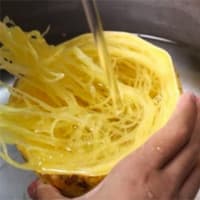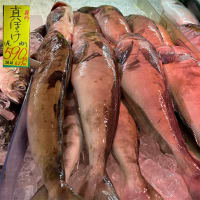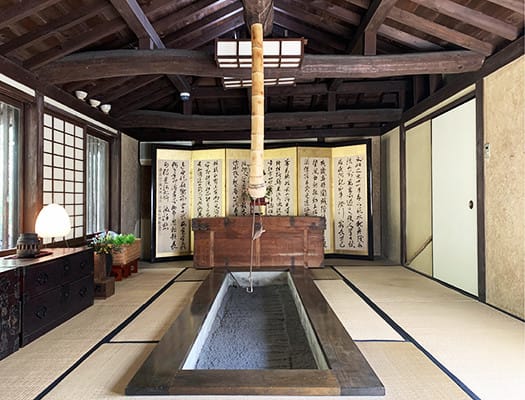

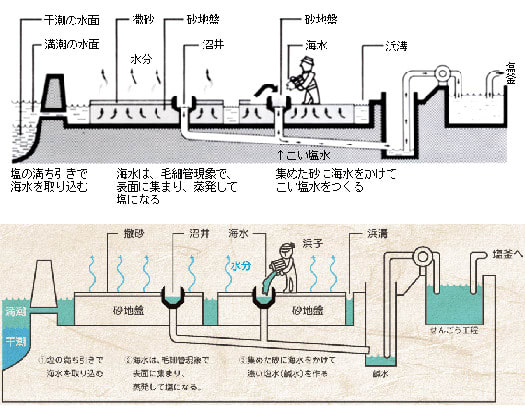
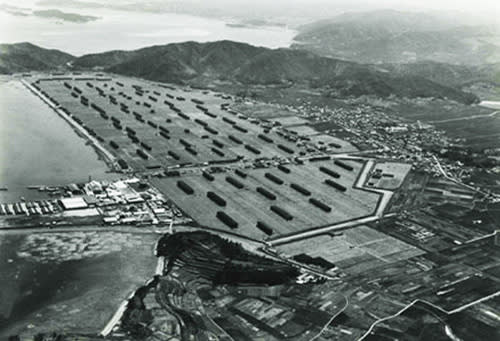
塩田というのは環瀬戸内海地域の十州が江戸期の最大産地。
そのなかでも讃岐は、一時期日本の塩生産の半分を占めるほどの
地域基幹産業になっていたとされ、その基板となる「入浜式塩田」土木工事で
この住宅の主人、久米通賢の主導性が大きかったということ。
表題のように「坂出塩田の父」として地域の誇りの人物であったという。
現代では塩というものは人間生活の基本として
専売公社が主管して安定供給を最優先した製塩体制が取られているので
産業構造としての側面が小さくなっているけれど、
まさに人間生活の基本・経済活動の基盤であっただろうことはあきらか。
環瀬戸内海地域はその製塩産業に於いて中枢的な地域だったという。
同地域の赤穂浪士事件でも背景に塩の利権争いがあったともいわれる。
実はわたしの家系でもご先祖さまが広島県福山市近隣の海浜地帯で
江戸中期には塩田を営んでいたという伝承があります。
そういうことで塩田というものに興味は持っていたけれど、
どういったメカニズムで江戸期の生産があったのか、は不勉強だった。
ちょうどこの人物の住宅を取り上げたので、ちょっとWEBで検索した結果。
直接取材とかしているわけではないので概念探索ですが、
アウトライン的な把握はやや頭に入ってきた。
科学者として江戸期に著名人になった久米通賢さんは同時に
経世済民の才も併せ持っていたようで、困窮する藩財政立て直し策として
入浜式塩田整備・土木工事計画とそれによる製塩業事業計画も立案したという。
とくに測量術について伊能忠敬以前に詳細な実測図を作った実績で知られるので、
それを活用して坂出周辺の海浜地帯を人工的に塩田化した。
藩自体の事業計画として採用されたものだけれど、
途中で藩財政がその費用出費に耐えられなくなった段階では
自費で計画を完遂させたのだという。結果、日本の塩生産の半分まで
讃岐地域の生産量が向上して地域の財政状況を救ったのだという。
住宅写真ではこういった事跡についての痕跡は見えにくいけれど(笑)
ひとつ気付いたのが巨大な「囲炉裏」であります。
温暖地の讃岐地方でここまで巨大な囲炉裏は採暖用だけとは考えにくい。
久米通賢住宅についての間取り的な説明資料は未発見なのですが、
普通に考えると大人数の来客が頻繁に出入りして
塩田工事の進捗に合わせてここで打合せをしたのだろうか。
あるいはさまざまな科学実験の必要性からの「火力加圧」装置として
異常に大きな囲炉裏が活躍したのだろうか、
実験工房的な施設装置というような理解が自然なようにも思える。
そんな想像に駆られております。
English version⬇
[Sakaide Shioda's father, Kume Michikata's house ② Shikoku living space exploration-33]
Execution ability to create salt farms for the core economy through actual surveying and civil engineering work. Completed by investing own expenses due to lack of funds of the clan. very.・ ・ ・
Shioda is the largest production area in the Edo period in the ten provinces of the Kan Seto Inland Sea region.
Among them, Sanuki once accounted for half of Japan's salt production.
It is said that it had become a regional core industry, and in the civil engineering work of the "Irihama-style salt farm" that will be the substrate.
The owner of this house, Kume Michikata, has a big initiative,
As the title suggests, he was a proud person in the area as "the father of Sakaide Shioda".
In fact, even in my family, my ancestors are in the beach area near Fukuyama City, Hiroshima Prefecture.
There is a tradition that salt farms were run in the middle of the Edo period.
In modern times, salt is the basis of human life.
Since the Japan Tobacco and Salt Corporation is in charge of the salt production system that gives top priority to stable supply.
Although the aspect of the industrial structure is getting smaller,
It is clear that it would have been the basis of human life and economic activities.
It is said that the Kan Seto Inland Sea area was a central area in the salt industry.
It is said that there was a salt dispute in the background of the Ako Ronin case in the same area.
That's why I was interested in Shioda,
I didn't study what kind of mechanism was used for production in the Edo period.
I just picked up this person's house, so I searched a little on the WEB.
It's a concept because I'm not directly interviewing it,
An outline grasp came to my mind.
Kume Michikata, who became a celebrity in the Edo period as a scientist, also
It seems that he also had the talent of the retired people, as a measure to rebuild the finances of the poor clan.
He also made a civil engineering plan for the maintenance of the Irihama salt farm and a business plan based on it.
Especially for surveying, he is known for his achievements in making detailed actual measurements before Tadataka Ino.
He used it to artificially salt the beaches around Sakaide.
Although it was adopted as a business plan for the clan itself,
At the stage when the clan's finances could not bear the expenses on the way
He said he completed the plan at his own expense. As a result, up to half of Japanese salt production
It is said that the production volume in the Sanuki area has improved and the financial situation in the area has been saved.
It's hard to see traces of these things in a house photo (laughs).
One thing I noticed is the huge "hearth".
It is hard to think that such a huge hearth in the Sanuki region, which is a warm region, is only for warming.
I haven't found any floor plan explanatory material about Kume Michikata housing.
If you think about it normally, a large number of visitors come and go frequently.
Did we have a meeting here in line with the progress of the salt farm construction?
Or as a "heat pressurization" device from the need for various scientific experiments
I wonder if an unusually large hearth was active.
It seems natural to understand that it is a facility device like an experimental studio.
I am driven by such an imagination.











